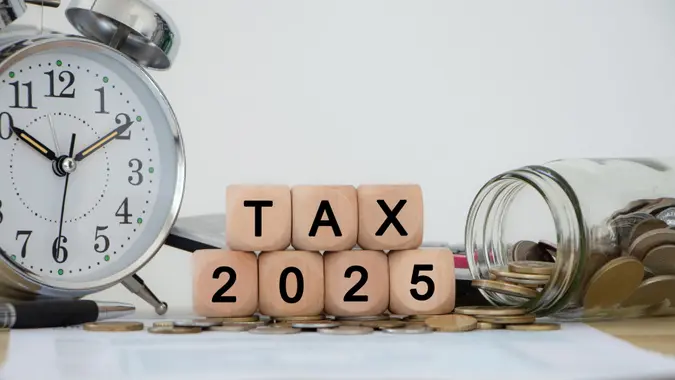4 Last-Minute Ways To Save Money on Your Taxes, According to George Kamel

Commitment to Our Readers
GOBankingRates' editorial team is committed to bringing you unbiased reviews and information. We use data-driven methodologies to evaluate financial products and services - our reviews and ratings are not influenced by advertisers. You can read more about our editorial guidelines and our products and services review methodology.

20 Years
Helping You Live Richer

Reviewed
by Experts

Trusted by
Millions of Readers
Taxes seem to be one of the only guarantees of life. There’s no way around them, and though it can be cathartic to complain about filing your tax return, when it comes to your total income or even taxable income, no one escapes the IRS tax-free.
Though nobody wants to owe more money on their tax bill than is absolutely necessary, this doesn’t mean there aren’t also ways to save on everything from your retirement plan to capital gains. Luckily, there are several smart strategies you can employ to reduce your total tax liability. In an informative video, personal finance expert George Kamel shared some tips for how to save money on your taxes.
While it may be too late to take advantage of some of these tips for filing your state or federal income taxes this year, keep these strategies in mind, as they could help you save money on your taxes in the future.
Check Your Paycheck Withholding
If you owed a tax bill when you filed in recent years, you’re likely withholding too little when it comes to your paychecks. However, if you’ve been receiving tax refunds each year, you’re likely overpaying your taxes throughout the year.
You can use the IRS Tax Withholding Estimator or other tax software to figure out the appropriate tax withholding for you based on your income, as wells as tax deductions and earned income tax credits. This way, you don’t end up with a huge tax bill when you file and you don’t give the government a 0% interest loan all year long.
If you owe a tax bill this year or receive a large tax refund, take the time now to look at your withholding to ensure you’re paying only what you need to.
Defer Your Income
If you’re expecting to receive a bonus or additional payment close to the end of the year, consider asking for a deferral. This might include a holiday bonus from your employer or your final paycheck of the year.
If you’re self-employed, you can strategically defer payments by waiting until the end of December to bill your clients so that you aren’t paid until the following year.
The reason for deferring the payments to the following year is that you’ll delay your tax liability on the additional income into the following tax year. However, deferring your income to save on taxes usually makes sense only if you expect to be in the same or lower tax bracket the following year.
Contribute More to Your Retirement Accounts
Making 401(k) or IRA contributions is another smart way to reduce your tax liability. The greater the percentage of your gross income that you allocate toward your 401(k) or IRA, the less taxes you’ll owe to the IRS since you’ll be deferring tax liability until later in life.
For 2025, the 401(k) contribution limit is $23,500 and the IRA contribution limit is $7,000. The 401(k) catch-up contribution for those aged 50 and over is an additional $7,500, for a total of $31,000, and the catch-up contribution for IRAs is $1,000.
Throughout the year, keep this in mind and make/increase contributions to your retirement accounts to reduce your tax bill.
Take Required Minimum Distributions
The IRS requires seniors to start withdrawing funds from tax-deferred retirement accounts starting in their 70s, which are known as required minimum distributions (RMDs). If you neglect to take your RMDs on time, you could owe a penalty of up to a whopping 25% on the amount you were supposed to withdraw.
So be sure to plan throughout the year and take the RMDs from either your traditional IRA or 401(k) to avoid penalties.
Caitlyn Moorhead contributed to the reporting for this article.
 Written by
Written by  Edited by
Edited by 

























